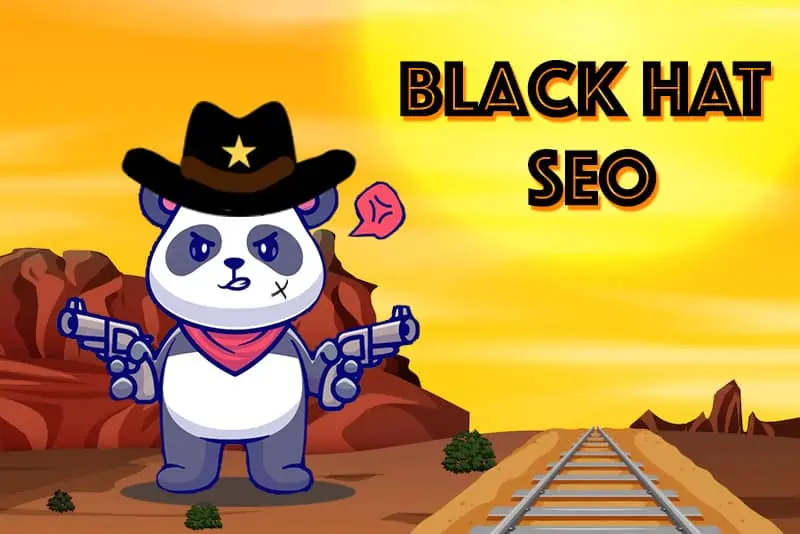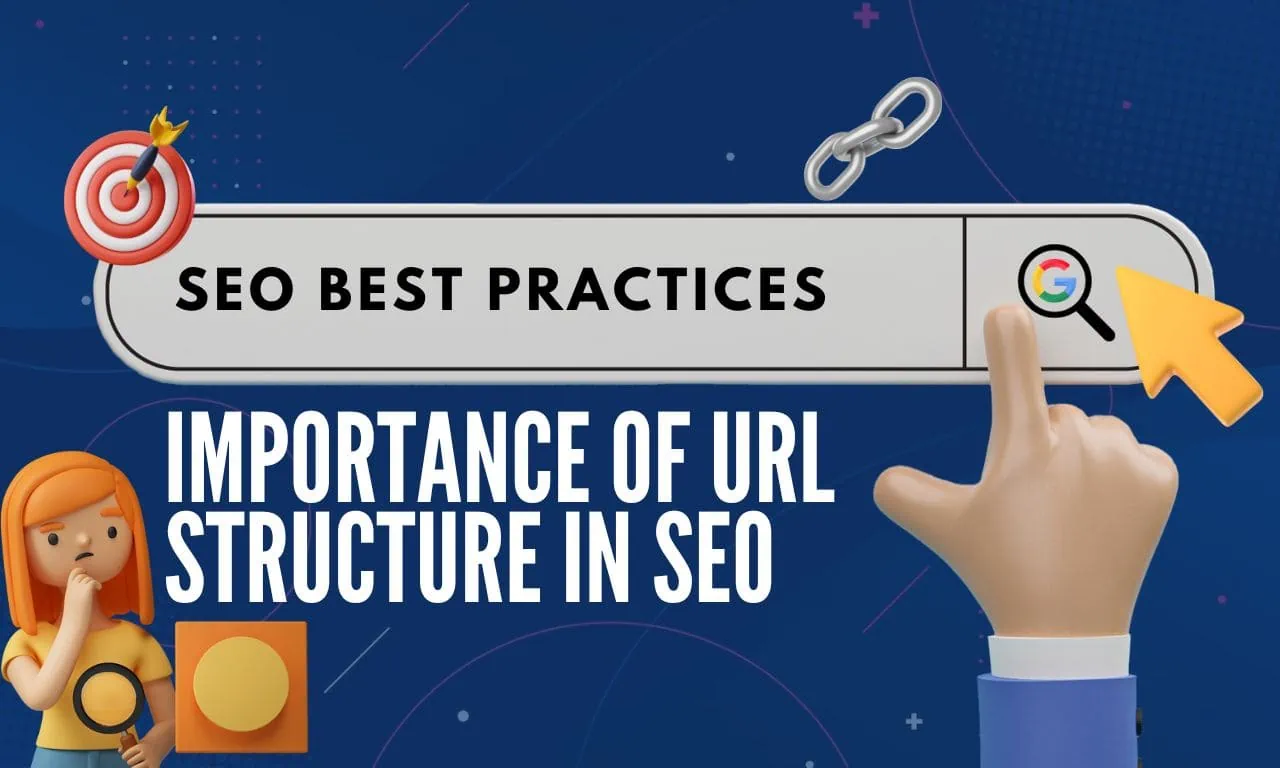When it comes to attracting new visitors to your website, search engine optimization (SEO) is essential and is often of key importance to the business.
However, search engines may penalize websites that use deceptive or unethical practices (black hat SEO tactics) to increase their rankings.
Knowing what behaviours are frowned upon and should be avoided is, thus, crucial. It is thus important for businesses to know what is black hat SEO (opposite of white hat SEO) and what it consists of so that it can be avoided.
What is Black Hat SEO?

The policies of major search engines like Google and Bing are crystal clear about prohibited behaviour types. The consequences for disobeying their rules are also made abundantly clear.
Penalization (algorithmic or manual) for engaging in black hat SEO practices can result in a drop in search engine algorithms rankings and, consequently, a decrease in organic traffic, unlike white hat SEO.
What are Black Hat SEO Techniques?
Black Hat SEO techniques are techniques used to try and improve your SERP rankings that are frowned upon by Google. You need to be careful with them as from time to time you will see Google crackdown on a website for using such techniques.
Below is a list of common black hat SEO techniques:
- Keywords Stuffing
- Cloaking
- Sneaky Redirects
- Poor Quality Content
- Paid Links
- Abusing Structured Data
1. Keyword Stuffing
The practice known as “keyword stuffing” is commonly employed to manipulate a page’s search engine ranking. Including as many keywords and variants detracts from the user experience. Furthermore, it could boost your page’s ranking for irrelevant searches. According to Google, the term “keyword stuffing” means the practice of loading a webpage with keywords or numbers in an attempt to manipulate a site’s ranking in Google search results. Often these keywords appear in a list or group, or out of context
2. Cloaking
Cloaking is the practice of showing a different piece of information to the users and search engines. Websites engaging in black hat techniques will employ such strategies to boost their rankings for keywords that have nothing to do with the subject matter of their pages.
This is common tactic spam sites use to conceal the malicious content they offer visitors from search engine crawlers.
3. Sneaky Redirects
Sneaky redirects are about sending the user to a different URL than the one they click upon. It is along the same line as cloaking, where it shows the search engine crawler to one page and the user to another.
Redirect should only be used as intended for redirecting users in the event of website domain or URL changes rather than for other purposes.
4. Poor Quality Content
Poor quality content is content that provides no value to the searchers. It is often associated with content that is scarped from another website either by a bot or a person. It is also associated with using hidden text that blends in with the website content just for the search engine crawler to reference it and rank them well on Google.
5. Paid Links
Paid links are about the buying and selling of links. The buying and selling of footer links are strictly forbidden by major search engines such as Google. Their site clearly states that “any links intended to manipulate PageRank or a site’s ranking in Google search results may be considered part of a link scheme and a violation of Google’s Webmaster Guidelines.” Free product giveaways in exchange for link placement are also considered link bait.
Users are encouraged to report black hat SEO and instances of link buying and selling to Google. Matt Cutts, the former head of Google’s web developers, suggests consulting FTC guidelines if you’re unsure of what constitutes a fair exchange. You should never pay another site to link to yours.
6. Abusing Structured Data
Abusing structured data is about providing inaccurate information to fool the search engines and users. Structured Data is also commonly referred to as “rich snippets” or “schema”.
It allows you to have the ability to modify the way your website appears in search engine results. It gives you more real estate on search engine result pages and makes your content stand out from the crowd such as reviews, podcasts, receipts, and books among others.
Black Hat SEO Examples (Past Sites)
J. C. Penney’s Black Hat Links
J. C. Penny is an American department store chain that has an online website, Jcpenny.com. The site was ranking for a vast amount of keywords from “skinny jeans” to “bedding” and “home decor” throughout the holiday season in 2011.
The site was exposed by that the New York Times for its practice and use of link schemes – “spamdexing“. This black hat SEO technique enabled this exceptional position in search results by staying under Google’s radar by having over 2,000 incoming links linking to its site for terms like “casual dresses”, “evening dresses” or “little black dress”.
Ultimately, Google took drastic action and greatly reduce the site’s visibility for J.C Penney.
Google Chrome’s Paid Link
Google Chrome is one of the most popular browsers with over 2.65 billion users and when it comes to its own guideline, even Google messed up occasionally. Google was caught not adhering to its practice of no paid links and including links to its Google chrome browsers in many sponsored blog posts.
The Google webspam team applied a 60 days penalty and drop in its Pagerank and reduce its positions for the search results for the term “browsers”.
Forbes Selling Links
Forbes.com, the extremely popular magazine website, has been notified by Google that they have been penalized for selling links on their website in 2011.
The issue is that they have linked keyword-rich anchor text to other sites on the eBusiness page and that it is a violation of Google’s policy on it.
Does using black hat SEO work?
The short answer is that these strategies are unlikely to be beneficial and may backfire on you. Google’s built-in tools are powerful and can identify low-quality content, keyword spam, and link spam. Aggressive use of these methods almost certainly results in instantaneous detection and retaliation from the system.
However, there are times when these methods work but it is generally only a temporary result. As their effects take hold, you receive an artificial boost in the rankings for the different search queries. Sooner or later, however, Google will catch on to the nature of your practices and hit you with a penalty, either automatically or manually.
Why Should You Avoid Black Hat SEO
Google clearly states that violating their Webmaster Guidelines “may lead to a site being removed entirely from the Google index or otherwise affected by an algorithmic or manual spam action.” In addition, “if a site has been affected by a spam action, it may no longer appear in results on Google.com.sg or any of Google’s partner sites,” as the search engine guidelines put it.
Increasing a website’s organic visibility and traffic is the whole point of SEO, but using black hat techniques can have the opposite effect. For your convenience, we’ve summarized the main reasons to avoid such methods in three sections.
- It Can Negatively Impact Your Search’s Rankings and Visibility
- It Won’t Drive Long-Term Results
- It Typically Results In a Poor User Experience
Conclusion
There are different types of SEO and black hat SEO is just one of them. When it comes to SEO, we should avoid black hat SEO techniques as it may lead to your website being banned from major search engines like Google. Therefore, we advise using white hat SEO strategies and legitimately climbing the search engine results pages whenever possible and selecting a trusted SEO agency that can achieve that.
Try out our FREE SEO audit tool today and get actionable checklists for your website in 60 seconds or less to improve on that adhere to Google’s guidelines aka White Hat SEO.








